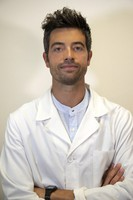
Journal Menu
► ▼ Journal Menu-
- Biomedicines Home
- Aims & Scope
- Editorial Board
- Reviewer Board
- Topical Advisory Panel
- Instructions for Authors
- Special Issues
- Topics
- Sections & Collections
- Article Processing Charge
- Indexing & Archiving
- Editor’s Choice Articles
- Most Cited & Viewed
- Journal Statistics
- Journal History
- Journal Awards
- Society Collaborations
- Conferences
- Editorial Office
Journal Browser
► ▼ Journal BrowserNeed Help?
Announcements
18 January 2023
Interview with Dr. Simone Patergnani—Editorial Board Member of Biomedicines
We had the pleasure of speaking with Dr. Simone Patergnani, Editorial Board Member of Biomedicines (ISSN: 2227-9059), to discuss his experience with Biomedicines and the recent research trends in the field.
|
|
Name: Dr. Simone Patergnani |
Dr. Patergnani received his Ph.D. in biochemistry, molecular biology and biotechnology at the University of Ferrara, Italy. To date, he works at the University of Ferrara, Italy (Department of Medical Sciences, Experimental Medicine section) and the University Hospital of Ferrara, Italy, as a post-doctoral researcher.
Dr. Patergnani’s research is mainly focused on investigating the contribution of different intracellular organelles to regulating different cell signaling pathways, actively collaborating with several international research groups. In parallel, his work also involves testing and verifying whether new next-generation molecules or drugs already used in the clinical field have beneficial effects in the transmission of various intracellular signals, in regulating cellular metabolism, and in activating/silencing various proteins responsible for specific cell functions. In particular, his research in recent years has focused on analyzing the contribution of these cellular mechanisms in cancer, neurodegeneration, mitochondrial diseases, genetic diseases and cardiovascular diseases.
We hope you enjoy the interview.
1. Could you tell us about Biomedicines and your role in the journal?
Biomedicines is a journal that reports original investigations and reviews in the field of cell biology. I serve the journal as an Editorial Board Member, as well as a Guest Editor.
2. What makes a great research paper?
I think that there is no good answer to this question. It is something individual. It is not certain that if an investigation enthuses me, it would have the same effect on another researcher. Everybody has personal preferences and can have a different opinion than me. However, undoubtedly, good research must have great scientific value, be performed with a series of convincing experiments and be well-conceived and developed.
3. What excites you the most about the field of autophagy?
Autophagy represents “the first love” of my research career. I started to investigate this molecular mechanism when I was a student. Since then, research in the field has reached great improvements and is constantly evolving. It is incredible how different molecular pathways that are fundamental for different molecular mechanisms are always related to the autophagy process!
4. Could you describe the difficulties and breakthrough innovations encountered in this research?
I think that the most difficult aspect of my research topic is that all the world studies it. However, at the same time, this represents a fundamental aspect of my research. Since I’m aware of the existence of this high competition, I always try to do my best to be at the top. I think that the identification of specific autophagy-related genes that have been then used as specific markers for the identification of autophagy levels represents one of the most important breakthrough innovations. Another important aspect in the field of autophagy is unveiling the existence of different and selective forms of autophagy.
5. What are some current challenges in this field?
The main challenge in the field of autophagy is to demonstrate that by manipulating this process it is possible to fight several human diseases. However, before this, it is important to improve our knowledge of autophagy in such diseases. Autophagy can have a dual role according to the stage of the pathology and a pharmacological treatment aimed to modify its levels must be appropriate for the actual autophagy activity present in the cell.
6. Do you have any advice for young researchers?
The only thing that I can say to a young researcher is to never give up when an experiment fails. In research, this often happens. The young researcher must be ready to repeat it. Of course, before repeating it, it is important to understand why the previous experiment failed, they must understand whether the failure is due to a technical problem or because the starting hypothesis of the work is not totally correct. In the latter case, the young researcher must be ready to change the experimental design. If the young researcher is able to switch their ideas and improve themselves, they switch from a “young researcher” to a “researcher”.
We are thankful for Dr. Patergnani’s time and his support for Biomedicines.





